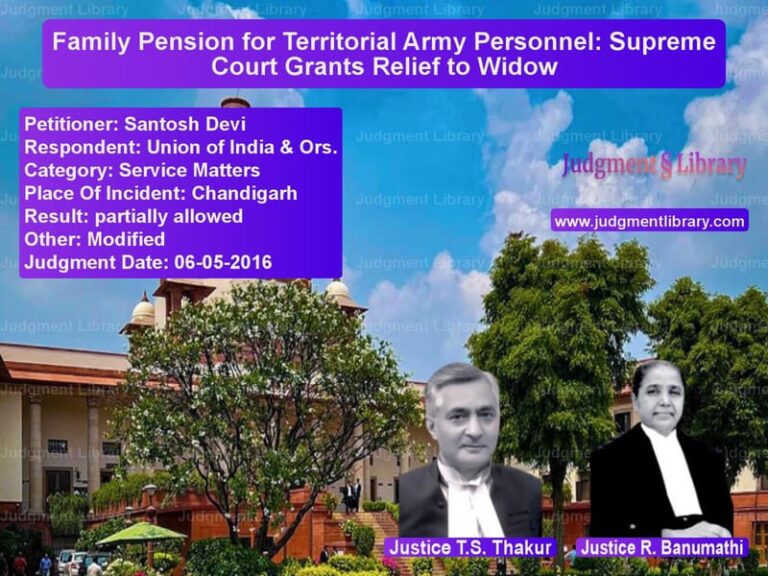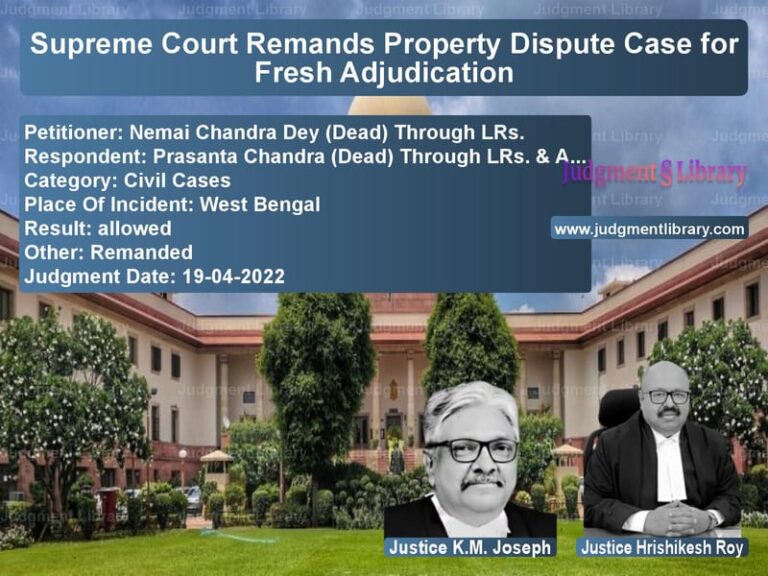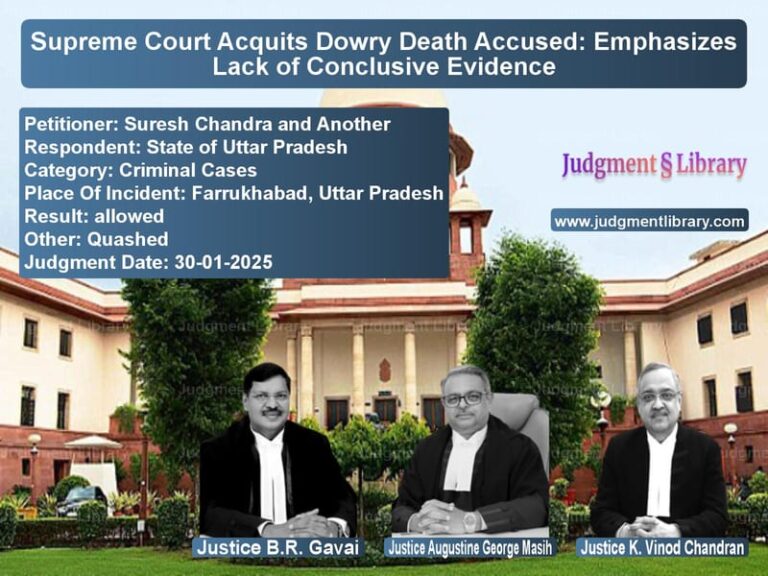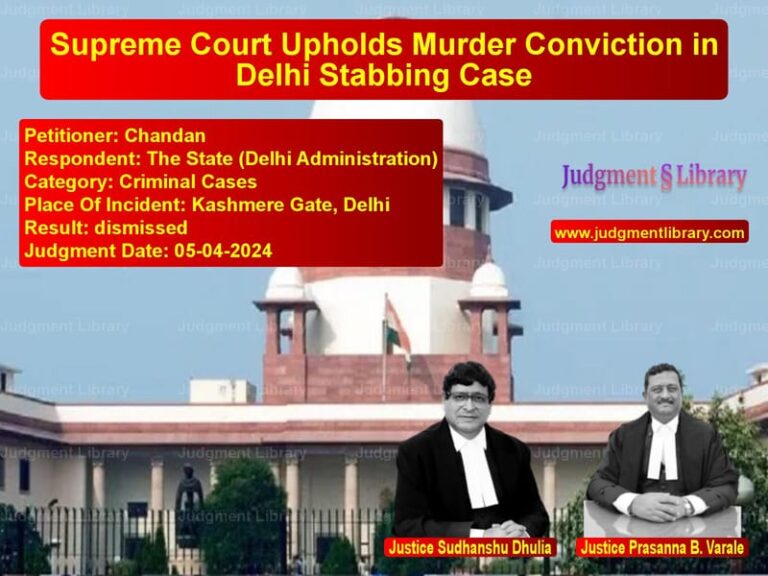Supreme Court Remands Excise Duty Case on Food Flavours in United Spirits Case
The Supreme Court of India, in the case of Commissioner Central Excise, Bangalore vs. M/s. United Spirits Ltd. & Anr., examined the excisability and valuation of food flavours manufactured by the respondent. The core issue in the dispute was whether royalty received by the company from liquor manufacturers should be included in the assessable value of food flavours for central excise duty purposes. The Supreme Court remanded the matter to the tribunal for a fresh determination, emphasizing the need for a detailed factual analysis.
Background of the Case
M/s. United Spirits Ltd. is a well-known manufacturer of Indian Made Foreign Liquor (IMFL) and owns several IMFL brands. The company also ‘manufactures’ food flavours at its facility in Bangalore. These food flavours are used in liquor manufacturing but in extremely small quantities.
The company had agreements with liquor manufacturers, allowing them to use its trademarks on IMFL manufactured by them. Additionally, the company supplied food flavours to these manufacturers. The revenue authorities alleged that the royalty received by United Spirits from liquor manufacturers was an additional consideration for the sale of food flavours and should therefore be included in the assessable value for central excise duty.
The adjudicating authority confirmed the excise duty demand, leading to an appeal before the Customs, Excise, and Service Tax Appellate Tribunal (CESTAT). The tribunal ruled in favor of United Spirits Ltd., which prompted the Revenue to challenge the decision before the Supreme Court.
Petitioner’s Arguments (Revenue)
- The revenue contended that the royalty payments received by the respondent from liquor manufacturers were directly related to the supply of food flavours.
- It was argued that the sale price of food flavours declared by the respondent was not the sole consideration and that the royalty must be included in the assessable value under Section 4 of the Central Excise Act.
- The revenue relied on the decision in Pepsi Foods Ltd. vs. Collector of Central Excise, where the Supreme Court had held that royalty received for using a brand name was an additional consideration for the sale of concentrate and should be included in the assessable value.
- Since the respondent was charging different prices for food flavours supplied to its own units and independent buyers, it indicated that royalty payments were linked to food flavours.
Respondents’ Arguments (United Spirits Ltd.)
- The respondent contended that royalty payments were entirely for the use of trademarks and had no connection with food flavours.
- They pointed out that many brands of IMFL manufactured under the agreements did not use food flavours, yet the liquor manufacturers still paid royalties.
- Food flavours were sold to third-party buyers who did not pay any royalty, proving that the royalty was unrelated to food flavours.
- The company argued that the assessable value of food flavours was properly declared, and the royalty should not be included.
Key Observations by the Supreme Court
- The Court observed that there was no clear evidence establishing a direct nexus between the royalty payments and the sale of food flavours.
- It noted that the tribunal had not thoroughly examined whether the royalty was linked to the price of food flavours or solely for the use of trademarks.
- The Court emphasized that excisability must be determined based on whether the additional consideration (royalty) was directly related to the sale of the goods.
- The tribunal had failed to scrutinize the agreements properly to ascertain the actual nature of the royalty payments.
Final Judgment
The Supreme Court set aside the tribunal’s decision and remanded the matter for fresh consideration. It directed the tribunal to examine the agreements in detail and determine whether the royalty payments had any direct nexus with the sale of food flavours. The Court stated:
“A far greater and deeper scrutiny of facts is required before forming any opinion, one way or the other. It would be wrong to assume conclusions without fully establishing the factual matrix.”
The Court clarified that it had not expressed any opinion on the merits of the case and that the tribunal must conduct a detailed examination.
Implications of the Judgment
This judgment has significant implications for excise duty valuation:
- It reiterates the principle that additional consideration must be directly linked to the sale of goods to be included in assessable value.
- The ruling reinforces the need for detailed factual analysis in cases involving complex commercial agreements.
- It provides clarity on the distinction between royalty for trademark usage and consideration for the sale of goods.
- The decision may impact similar cases where companies receive royalties from franchisees or manufacturing partners.
Conclusion
The Supreme Court’s decision in Commissioner Central Excise, Bangalore vs. M/s. United Spirits Ltd. & Anr. highlights the importance of factual scrutiny in excise duty cases. By remanding the matter for reassessment, the Court ensured that taxation principles are applied correctly, preventing unjustified inclusion of royalty payments in assessable value. This judgment is expected to guide future cases involving excise valuation and related commercial transactions.
Don’t miss out on the full details! Download the complete judgment in PDF format below and gain valuable insights instantly!
Download Judgment: Commissioner Central vs Ms. United Spirits Supreme Court of India Judgment Dated 05-01-2017.pdf
Direct Downlaod Judgment: Direct downlaod this Judgment
See all petitions in Income Tax Disputes
See all petitions in Tax Refund Disputes
See all petitions in Customs and Excise
See all petitions in Judgment by Dipak Misra
See all petitions in Judgment by N.V. Ramana
See all petitions in Remanded
See all petitions in Remanded
See all petitions in supreme court of India judgments January 2017
See all petitions in 2017 judgments
See all posts in Taxation and Financial Cases Category
See all allowed petitions in Taxation and Financial Cases Category
See all Dismissed petitions in Taxation and Financial Cases Category
See all partially allowed petitions in Taxation and Financial Cases Category







